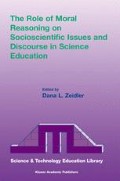Access this chapter
Tax calculation will be finalised at checkout
Purchases are for personal use only
Preview
Unable to display preview. Download preview PDF.
References
Abd-El-Khalick, F., & Lederman, N. G. (2000). The influence of history of science courses on students’ views of the nature of science. Journal of Research in Science Education, 37(10), 1057–1095.
Allegretti, C. L. & Frederick, J. N. (1995). A model for thinking critically about ethical issues. Teaching of Psychology, 22(1), 46–48.
American Association for the Advancement of Science. (1993). Benchmarks for science literacy. New York: Oxford University Press.
Bell, R.L., Lederman, N. G., & Abd-El-Khalick, F. (2000). Developing and acting upon one’s conception of the nature of science: A follow up study. Journal of Research in Science Teaching, 37(6), 563–581.
Berkowitz, M. W. (1997). The complete moral person: Anatomy and formation. In J. M. DuBois, ed., Moral issues in psychology: Personalist contributions to selected problems. Lanham, MD: University Press.
Brinckerhoff, R. F., & Zeidler, D. L. (1992). Values in school science: A teacher’s handbook. Reading, MA: Addison-Wesley.
Brown, A. (1997). Transforming schools into communities of thinking and learning about serious matters. American Psychologist, 52, 399–413.
Chapman, B. S. (2001). Emphasizing concepts and reasoning skills in introductory college molecular cell biology. International Journal of Science Education, 23, 1157–1176.
Chinn, C. A., & Brewer, W. F. (1993). The role of anomalous data in knowledge acquisition: A theoretical framework and implications for science instruction. Review of Educational Research, 63(1), 1–49.
Chinn, C. A., & Brewer, W. F. (1998). An empirical test of a taxonomy of responses to anomalous data in science. Journal of Research in Science Teaching, 35(6), 623–54.
Dewey, J. (1910). How we think. Boston: D.C. Heath.
Dick, R. D. (1991). An empirical taxonomy of critical thinking. Journal of Instructional Psychology, 18, 79–92.
Driver, R., Leach, J., Millar, R., & Scott, P. (1996). Young people’s images of science. Bristol, PA: Open University Press.
Ennis, R. H. (1962). A concept of critical thinking. Harvard Educational Review, 32, 81–111.
Ennis, R. H. (1991). Critical thinking: A streamlined conception. Teaching Philosophy, 14, 5–24.
Green, T.F. (1975). Perspective on thinking about change. Report for: Exploration Fund of the Kettering Foundation.
Inhelder, B. & Piaget, J. (1958). The growth of logical thinking: From childhood to adolescence. New York: Basic Books, Inc. Publishers.
Kohlberg, L. (1972). Development as the aim of education. Harvard Educational Review, 42(4), 449–496.
Kohlberg, L. (1987). The cognitive-developmental approach to moral development. in P. F. Jr. Carbone (Ed.), Value theory and education (p. 226–243). Malabar, Florida: Robert E. Krieger Publishing Company.
Kuhn, D. (1991). The skills of argument. Cambridge: Cambridge University Press.
Kuhn, D. (1999). A developmental model of critical thinking. Educational Researcher, 28(2), 16–25.
Lederman, N.G. (1992). Students’ and teachers’ conceptions of the nature of science: A review of the research. Journal of Research in Science Teaching, 29(4), 331–359.
Lederman, N. G. & Abd-El-Khalick, F. (1998). Avoiding de-natured science: Activities that promote understandings of the nature of science. Paper presented at the annual meeting of the Association for the Education of Teachers in Science, Minneapolis, Minnesota.
Lederman, N. G. & O’Malley, M. (1990). Students’ perceptions of tentativeness in science: Development, use, and sources of change. Science Education, 74, 225–239.
Lipman, M. (1991). Thinking in Education. New York: Cambridge University Press.
McComas, W. F., Clough, M. P. & Almazroa, H. (2000). The role and character of the nature of science in science education. In W. F. McComas (Ed.), The nature of science in science education: Rationales and strategies. Dordrecht, The Netherlands: Kluwer Academic Publishers.
Nucci, L. P. (2001). Education in the Moral Domain. Cambridge: Cambridge University Press.
Paul, R. W. (1984). Critical thinking: Fundamental to education for a free society. Educational Leadership, 42, 4–14.
Paul, R. W. (1990). Critical thinking. Rohnert Park, CA: Center for Critical Thinking and Moral Critique, Sonoma State University.
Piaget J. (1965). The moral judgment of the child (M. Gabain, Trans.). New York: The Free Press.
Posner, G. J., Strike, K. A., Hewson, P. W., & Gertzog, W. A. (1982). Accommodation of a scientific conception: Toward a theory of conceptual change. Science Education 66(2): 211–227.
Sahakian, W. S. & Sahakian, M. L. (1966). Ideas of the great philosophers. New York: Barnes & Noble, Inc.
Zeidler, D. L. (1997). The central role of fallacious thinking in science education. Science Education, 81(1), 483–495.
Zeidler, D. L., Lederman, N. G., & Taylor, S. C. (1992). Fallacies and student discourse: Conceptualizing the role of critical thinking in science education. Science Education, 76(4), 437–450.
Zeidler, D. L. & Schafer, L. E. (1984). Identifying mediating factors of moral reasoning in science education. Journal of Research in Science Teaching, 21(1), 1–15.
Zeidler, D. L., Walker, K. A., Ackett, W. A., & Simmons, M. L. (2002). Tangled up in views: Beliefs in the nature of science and responses to socioscientific dilemmas. Science Education, 86(3), 343–367.
Zimmerman, C. (2000). The development of scientific reasoning skills. Developmental Review, 20, 99–149.
Zohar, A., Weinberger, Y., & Tamir, P. (1994). The effect of the biology critical thinking project on the development of critical thinking. Journal of Research in Science Teaching, 31, 183–19
Author information
Authors and Affiliations
Editor information
Editors and Affiliations
Rights and permissions
Copyright information
© 2003 Kluwer Academic Publishers
About this chapter
Cite this chapter
Simmons, M.L., Zeidler, D.L. (2003). Beliefs in the Nature of Science and Responses to Socioscientific Issues. In: Zeidler, D.L. (eds) The Role of Moral Reasoning on Socioscientific Issues and Discourse in Science Education. Science & Technology Education Library, vol 19. Springer, Dordrecht. https://doi.org/10.1007/1-4020-4996-X_5
Download citation
DOI: https://doi.org/10.1007/1-4020-4996-X_5
Publisher Name: Springer, Dordrecht
Print ISBN: 978-1-4020-3855-6
Online ISBN: 978-1-4020-4996-5
eBook Packages: Springer Book Archive

